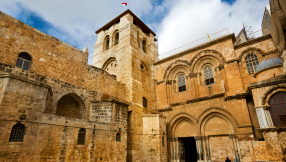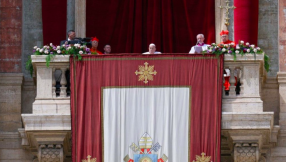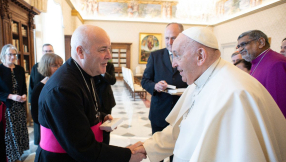
At Christmas we seek solace from the tumult of politics and the darkness of the world. We take comfort in magic and sparkle, mountains of food and festive films. On the Christmas adverts, it is always snowing outside and sparkling inside. Windows glow, children are rosy-cheeked and presents are expertly wrapped.
Even though most of us probably never actually experienced a Christmas like this - we may have memories of family awkwardness, arguments or absences – we want to recapture a fabricated nostalgia, a sense of belonging and contentment.
And I fully immerse myself in all this. I always look forward to dipping into my collection of Christmas DVDs. Nestling on the shelf between It's a Wonderful Life and Elf, there is a film of the nativity.
But is this really just another nice story to watch alongside the usual feel-good fare? Can we tell the difference between fact and fiction? I believe that if we take the claims of this story seriously, we will truly find the sense of belonging we all seek.
We can't know every detail of what happened that first Christmas night in Bethlehem, but the gospel-writer Luke gives us one account. And he wants to convince us that these events really took place. He makes clear that he has "carefully investigated everything from the beginning", including eyewitness accounts, so that his friend Theophilus "may know the certainty of the things you have been taught."
Christmas tells us that we are all part of God's story. By breaking into history as a tiny baby, God has invited us to join the circle of wonder gathered around the manger. We gaze in alongside the shepherds and wise men, sharing with them and all our fellow humans an understanding that we are all sinners, saved by grace through this baby who grew up to change the world. Whatever you make of the New Testament accounts of his birth, life and death, Jesus Christ is the most significant person in world history.
You may be put off investigating the Christmas story by the church itself. Terrible acts have been carried out in God's name over the centuries, culminating in revelations of sickening abuse scandals and cover-ups. Christians often get it terribly wrong. We are flawed and broken. But Jesus came to save flawed and broken people.
Or maybe you find the Christmas story itself to be offensive. Which is understandable. This story tells our culture – which places ultimate value in personal autonomy – that in reality we are not our own; we cannot save ourselves, we owe everything to Another.
The other gospel writer to record the Christmas story was Matthew. He speaks of the wise men visiting Herod to ask him about the new king they had seen foretold in the stars. Herod felt deeply threatened by this baby. He had power and was desperate to hold onto it. He feared the prophecy and tried to stamp it out.
Political landscapes around the world are full of Herods, trying to cling onto power. But as Assad has found in Syria, all human power is eventually swept away.
Perhaps we all have some of Herod's tendencies in us? It's not the role most of us would want in the school nativity, but we all have things we cling onto, things we put our faith in, whether it be career, relationships, status, identity or the desire to control our own lives. We may feel threatened by the story that tells us we need saving from ourselves, and that we can instead find our security and meaning in the person of Jesus Christ.
The Christian story tells us that Jesus came to us as a helpless baby, and as a man he freely gave up his power and autonomy at the cross. He did this to offer each of us a gift of love and grace that is completely undeserved.
If the story of the baby in the manger is true, it means there is a God and we know his name. If it is true, it is the best news anyone could ever hear, and so surely we must consider it.
The Christian faith doesn't tell us how to vote or what policies to pursue. But it teaches us to forgive others because we have been forgiven, to seek justice with love and compassion, and to join together in the hope that Jesus will one day put the whole world to rights and deal with the darkness and chaos once and for all.
Luke also tells us about an old man in the temple called Simeon who held baby Jesus and declared: "my eyes have seen (God's) salvation". His eyes saw not a way of life, not an ideology, not a set of rules, but a human. Salvation is a person. Jesus himself later said : "I am the way" not "this is the way". He claimed to be the one and only human being who will not let you down.
Perhaps you feel uplifted at this time of year by candlelit carols in ancient churches, adding your presence to the worship and wonder that has taken place there for centuries.
Don't be afraid this Christmas to let yourself be captured by the awe of the shepherds in the dark fields, confronted by the brightness of angels. Or the determination of the wise men, travelling hundreds of miles to seek the promised king.
Don't be afraid to gaze into the crib this Christmas, like Simeon, who looked beyond the baby to the hope that he brought. You might find something wonderful there that will last long beyond the New Year.
Tim Farron has been the Member of Parliament for Westmorland and Lonsdale since 2005 and served as the Leader of the Liberal Democrat Party from 2015 to 2017. Tim is also the host of Premier's 'A Mucky Business' podcast, which unpacks the murky world of politics and encourages believers around the UK to engage prayerfully. He is the author of A Mucky Business: Why Christians should get involved in politics."













